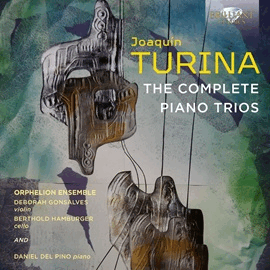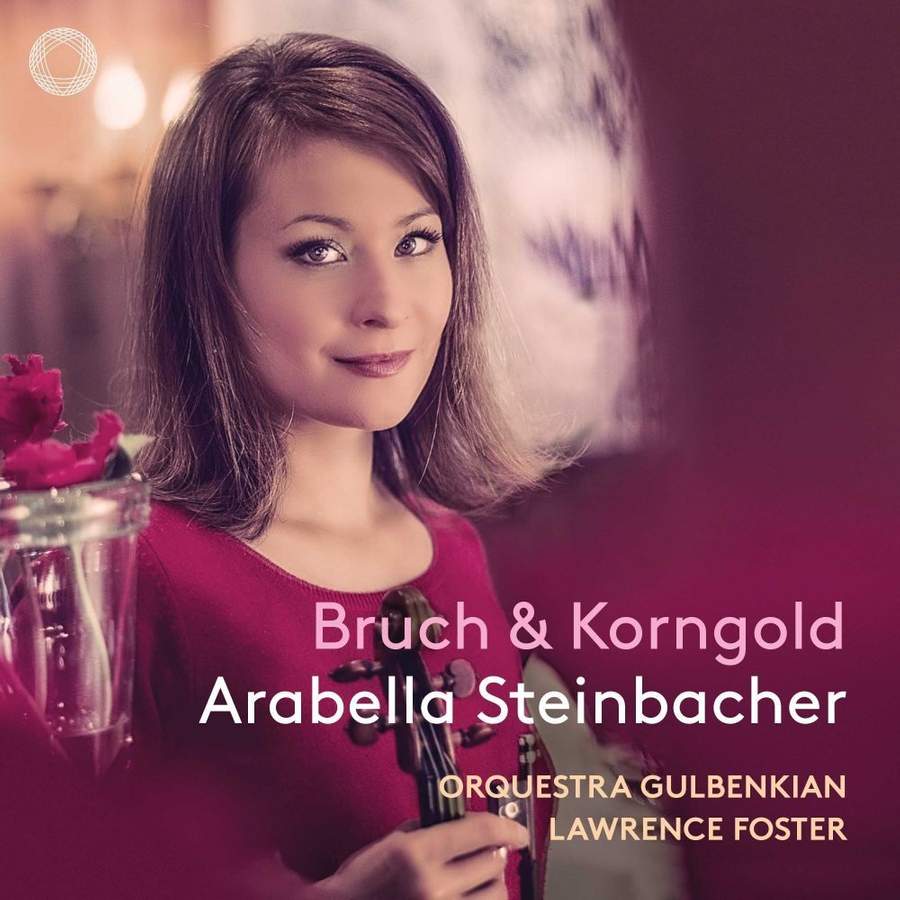Von den dreißig Aufnahmen des Violinkonzerts von Erich Wolfgang Korngold, die ich besitze, ist die mit Arabella Steinbacher zugleich die längste (27’06, gegenüber 21’32 für Heifetz, Schöpfer des Konzerts) und die am prächtigsten aufgenommene. Die Einspielung klingt ungemein präsent und durchsichtig, was natürlich auch damit zu tun hat, dass die Solistin und das Gulbenkian-Orchester unter Lawrence genussvoll alle Schönheiten der Kompositionen bis ins Detail auskosten und dem Abschluss des Korngold-Werkes eine Feierlichkeit geben, die nicht aufgesetzt ist, sondern sich ganz selbstverständlich aus der hier vorgestellten Auffassung der Komposition ergibt. Selten hat man auch so schön gehört, wie das Orchester die Solistin ‘trägt’.
Arabella Steinbachers spielt ohne Aufregung und ohne das Romantische des Konzerts zu überbetonen. Sie tut es auch nicht bei den andern beiden Werken, dem herrlichen Poème von Chausson und dem bestbekannten Konzert in g-Moll von Max Bruch, das sie ebenfalls ruhiger angeht als die meisten andern Geiger. Das Romantische aber ist da, nur gibt ihm die Solistin eigene Farben und eine neue Frische. Das ist ebenso erfreulich für das Korngold- wie für das Bruch-Konzert. Meiner Meinung nach, aber kommt Frau Steinbachers Spiel am Schönsten zur Geltung im Poème von Edouard Chausson, dessen schon etwas schwülstige Atmosphäre durch ihr ungemein feines, kraftvolles und makelloses Spiel starke Emotionen im Zuhörer zu wecken weiß, zumal die Partnerschaft zwischen ihr und dem Orchester unter der umsichtigen Leitung von Lawrence Foster stets optimal ist.
Of the thirty recordings of Erich Wolfgang Korngold’s Violin Concerto that I own, the one with Arabella Steinbacher is at once the longest (27’06, compared to 21’32 for Heifetz, creator of the concerto) and the most magnificently recorded. The recording sounds immensely present and transparent, which of course also has to do with the fact that the soloist and the Gulbenkian Orchestra under Lawrence Foster delightfully savor all the beauties of the compositions down to the last detail and give the conclusion of Korngold’s work a solemnity that is not imposed but arises quite naturally from the conception of the composition presented here. Rarely has one also heard the orchestra ‘carry’ the soloist so beautifully.
Arabella Steinbacher plays without excitement and without overemphasizing the romanticism of the concerto. Nor does she do so in the other two works, the magnificent Poème by Chausson and the best-known Concerto in G minor by Max Bruch, which she also approaches more calmly than most other violinists. But the romanticism is there, only the soloist gives it her own colors and a new freshness. This is as pleasing for the Korngold as for the Bruch concerto. In my opinion, however, Ms. Steinbacher’s playing is at its best in the Poème by Edouard Chausson, whose already somewhat sultry atmosphere knows how to awaken strong emotions in the listener through her immensely fine, powerful and flawless playing, especially since the partnership between her and the orchestra under the careful direction of Lawrence Foster is always optimal.


















